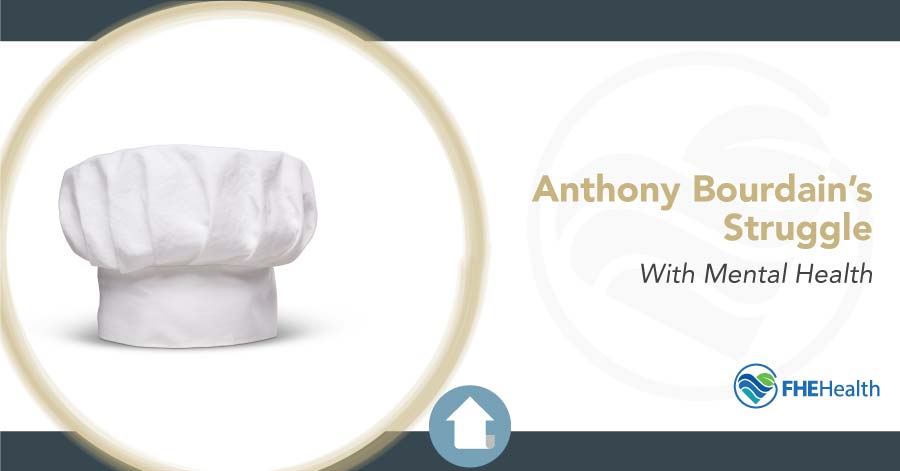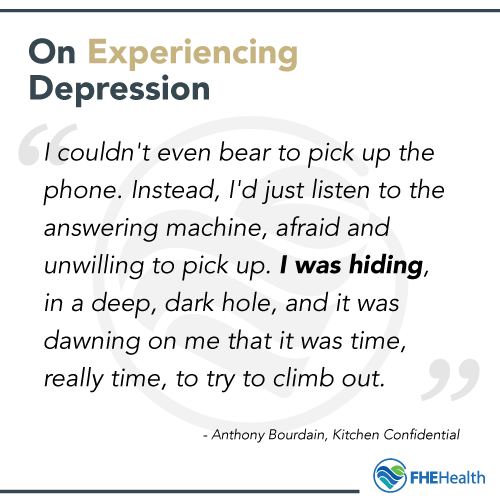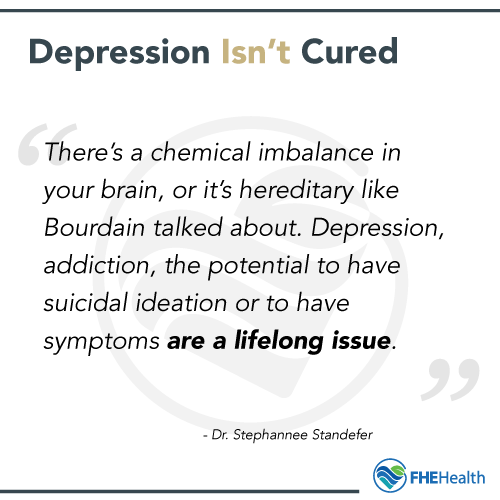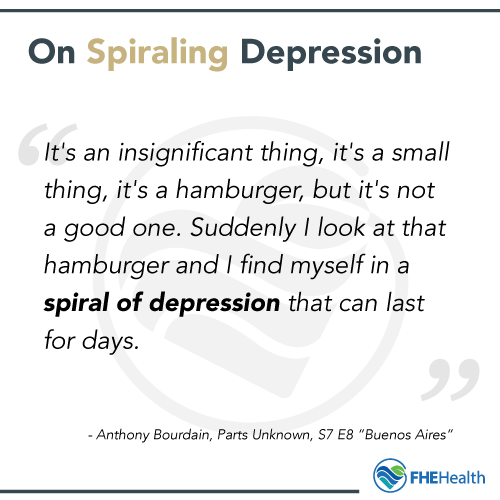
Anthony Bourdain was an American chef, celebrity, author and travel enthusiast who worked as the executive chef at the Brasserie Les Halle’s restaurant in Manhattan, New York. He also penned the best-selling novel, “Kitchen Confidential: Adventure in the Culinary Underbelly” in 2000. His cooking and travel show “A Cook’s Tour” aired 35 episodes in 2002 and 2003, and he later hosted a number of other increasingly successful television programs, including “The Layover”, “No Reservations” and “Anthony Bourdain: Parts Unknown.”
Understanding the Life of Anthony Bourdain
 Extremely successful and very well-liked in the restaurant industry, Anthony Bourdain suffered from alcohol and drug addiction and depression for many years before taking his own life. In 2000, Bourdain wrote the best-seller “Kitchen Confidential” in which he stated he used psychedelics, pharmaceuticals, amphetamines, heroin and cocaine alongside his fellow kitchen workers throughout the various restaurants he worked in. During this time, he shared that he would often fall into a deep depression that was fueled by his substance abuse. “I couldn’t even bear to pick up the phone. Instead, I’d just listen to the answering machine, afraid and unwilling to pick up. I was hiding, in a deep, dark hole, and it was dawning on me that it was time, really time, to try to climb out.” (Kitchen Confidential)
Extremely successful and very well-liked in the restaurant industry, Anthony Bourdain suffered from alcohol and drug addiction and depression for many years before taking his own life. In 2000, Bourdain wrote the best-seller “Kitchen Confidential” in which he stated he used psychedelics, pharmaceuticals, amphetamines, heroin and cocaine alongside his fellow kitchen workers throughout the various restaurants he worked in. During this time, he shared that he would often fall into a deep depression that was fueled by his substance abuse. “I couldn’t even bear to pick up the phone. Instead, I’d just listen to the answering machine, afraid and unwilling to pick up. I was hiding, in a deep, dark hole, and it was dawning on me that it was time, really time, to try to climb out.” (Kitchen Confidential)
In 2002 he began hosting a series that featured culinary spots around the world, called “Part Unknown.” During this stint, Bourdain smoked cigarettes and made marijuana jokes, leaving others to assume he smoked weed. On episodes of this and subsequent shows, he would regularly drink with the natives. At this point in his life, Bourdain was extremely open and honest about his past battles and stated he looked in the mirror one day and decided he “wanted to live.”
According to Dr. Stephannee Standefer, director of the Master’s Program in Counseling at Northwestern University, even though Bourdain was honest and open about his depression, it didn’t mean he was cured. She said, “There’s a chemical imbalance in your brain, or it’s hereditary like Bourdain talked about. Depression, addiction, the potential to have suicidal ideation or to have symptoms are a lifelong issue.”
Bourdain’s struggles were and are commonplace among restaurant workers. According to a survey by the Substance Abuse and Mental Health Services Administration, restaurant and accommodation workers have the highest rates of substance abuse disorders of any other industry, with approximately 19 percent of all workers reporting illicit drug use.
View this post on Instagram
About His Death
On June 8, 2018, just 17 days before his 62nd birthday, Bourdain was found dead of an apparent suicide by hanging in his hotel room at the La Chambard Hotel in Kaysersberg. He was traveling with his friend Eric Ripert and filming an episode for “Parts Unknown.” Ripert was worried after Bourdain missed breakfast and dinner and had him checked on. Toxicology reports determined there were traces of therapeutic nonnarcotic medications in his system. The act appeared to be impulsive. He is survived by his 11-year-old daughter, Ariane Bourdain.
Anthony Bourdain’s Mental Health and Drug Use
 The world of culinary arts is extremely competitive. Individuals in the industry often work off-hours in high-pressure environments, which often leads to stress and affects the mental health of the participants. Sometimes it includes days and days of repetition. Bourdain once said, “Admittedly, it’s a life that grinds you down. Most of us who live and operate in the culinary underworld are some fundamental way dysfunctional.” This is a struggle many in the culinary and restaurant industry face. As Anthony Bourdain found more success in entertainment he engaged in another world of high stress – trying to host and create an engaging television show while traveling around the world.
The world of culinary arts is extremely competitive. Individuals in the industry often work off-hours in high-pressure environments, which often leads to stress and affects the mental health of the participants. Sometimes it includes days and days of repetition. Bourdain once said, “Admittedly, it’s a life that grinds you down. Most of us who live and operate in the culinary underworld are some fundamental way dysfunctional.” This is a struggle many in the culinary and restaurant industry face. As Anthony Bourdain found more success in entertainment he engaged in another world of high stress – trying to host and create an engaging television show while traveling around the world.
In one episode of “Parts Unknown”, while visiting Argentina, Bourdain engaged in a therapy session as a way to highlight the country’s acceptance of mental health treatment. In the scene, he opened up about how everything, including a hamburger, could trigger his moods. He stated, “I will find myself in an airport, for instance, and I’ll order an airport hamburger. It’s an insignificant thing, it’s a small thing, it’s a hamburger, but it’s not a good one. Suddenly I look at that hamburger and I find myself in a spiral of depression that can last for days.” Bourdain often felt isolated and stated it was difficult to explain how a meal could make him depressed. While it’s possible he engaged in the scene as a bit, has words may ring true to people who have experienced how the initial spiraling of depression feels: a thought causes existential questioning of your worldview and you cannot pull yourself out.
View this post on Instagram
To comment more on his state of mind would be speculative. It is fair to say that depression can strike quickly and unexpectedly. We can’t say what could or should have been done except to reflect on the tragedy as a reminder of the reality of depression. Anthony Bourdain brought a love and passion of food and culture to millions of viewers and enjoyed success doing so. Even these achievements do not overcome the sway that our mental health can have on us.
Symptoms of Mental Health and Substance Abuse
 According to the National Institute on Drug Abuse, individuals who suffer from mental health issues often develop substance abuse disorders. The reverse is also true. Statistics show that over 60 percent of adolescents who are enrolled in a substance abuse program, also meet the criteria for mental illness. For individuals who suffer from depression, suicide is a genuine threat, with 50% of all suicides being tied to some form of depression. It’s important that we learn to recognize these symptoms and react to them. Some symptoms include:
According to the National Institute on Drug Abuse, individuals who suffer from mental health issues often develop substance abuse disorders. The reverse is also true. Statistics show that over 60 percent of adolescents who are enrolled in a substance abuse program, also meet the criteria for mental illness. For individuals who suffer from depression, suicide is a genuine threat, with 50% of all suicides being tied to some form of depression. It’s important that we learn to recognize these symptoms and react to them. Some symptoms include:
- Feeling sad, empty and anxious
- Feeling hopeless or helpless
- Constantly irritable
- Lack of interest in activities
- Difficulty concentrating
- Loss of energy
- Difficulty sleeping
- Changes in appetite
- Aches and pains
Reactions to Bourdain’s Death
Upon the announcement of Bourdain’s death, tributes, prayers, and thoughts poured in from fans and those close to him throughout the world. Carla Hall from “The Chew” stated he was a “beloved presence in the culinary community.” Gordon Ramsay stated he was “stunned and saddened by the loss of Anthony Bourdain. He brought the world into our homes and inspired so many people to explore cultures and cities through their food.” Christie Teigen claimed Bourdain was one of her idols, and celebrity Debra Messing called him a “master of his craft.”
Response to Suicide
With knowledge and care, it’s possible to help prevent suicide. The National Suicide Prevention Lifeline offers free and confidential support to those who need it most at 1-(800)-273-8255. If you are currently stable and facing depression we urge you to seek out the care of a licensed therapist or an inpatient program.






